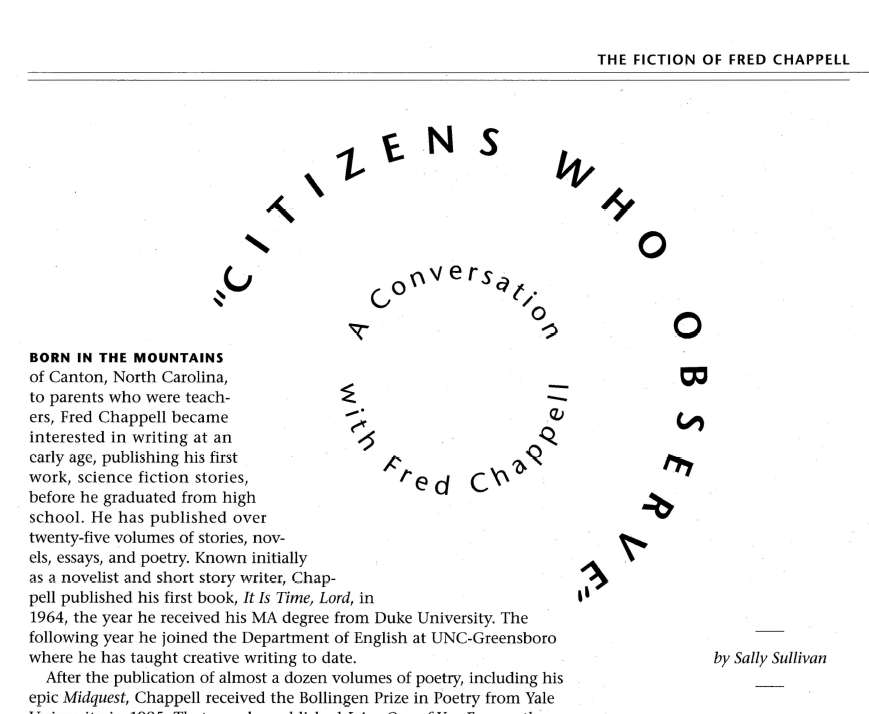Friday from the Archives: “Citizens Who Observe: A Conversation with Fred Chappell” by Sally Sullivan from NCLR 7 (1998).
We join family, friends, and countless students in mourning the passing of beloved professor, former state poet laureate, and author Fred Chappell, who passed away this January.
“Ol’ Fred” was a long time friend of NCLR, contributing in some form or fashion in over sixteen issues, both in print and online. He graciously allowed us to print his poetry and excerpts from his fiction; he wrote literary criticism; and scholarly insights about his peers, mentors, and influential North Carolina authors.
We have an entire section of our 1998 issue dedicated to “The Fiction of Fred Chappell.” The last piece is the fully expanded interview Sullivan did with Chappell for her online collection “Writing Fiction and Poetry: Essays by Twelve North Carolina Writers.”
Sullivan wrote, “Chappell’s facility with language, his gift of discovering the mot juste, the depth of his perception, and the breadth and depth of his astounding knowledge have made him legendary among those who know him and his writing. Throughout his prolific career, grateful students have continued to come and go, and Chappell has tirelessly and generously continued to read manuscript after manuscript for them and countless other writers who have sent their work to him for review.” Twenty-six years after this publication, the public offerings upon news of Chappell’s passing were almost word-for-word repetitions of it, indicative of his life-long service to authors across NC and beyond.
Sullivan: “How do you perceive the duality of your role as teacher/writer? In what ways are they mutually supportive professions? In what ways are they not?
Chappell: Well, some of them are obviously mutually supportive: you get a little more leisure time in order to write. When you’re a teacher that’s one of the perks. The other perks are access to a library, conversations with people who are interested, more or less, in the same kind of things you’re interested in, and students who are young people. That’s always a perk. The downsides are so considerable that I don’t want to even bother with them because you know them and everybody else who teaches and writes knows them.”
“From your experience what is the worst misconception people have about writers that you wish you could rectify?
Damn. I have no idea. I don’t know what people think about writers. Boy, that’s a hard question. Hold on a minute . . .. That we’re different from other people, that we don’t have the same kind of lives other people do, that we don’t have to pay our taxes, and water our lawns, or raise our children, or do our jobs. We’re in the world like everybody else; our job is to observe the world, to be a clerk, in other words, which has been
our use since Egyptian times, if not before. The other misconception is to think that writers have any power at all over what goes on in the world. We’re citizens who observe, that’s all.”
Read the first part of the interview here and order the issue for your collection. For all the issues with Chappell’s work, see the package.
